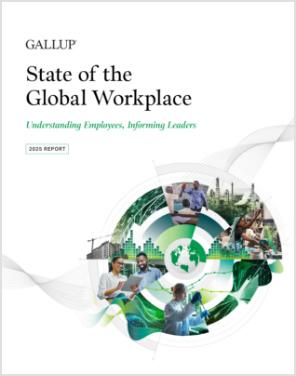The hard job of managing people has gotten even harder in recent years.
New demands for worker flexibility in the remote and hybrid workplace and increased risk of employee mental health problems add to the already difficult job of managing. In 2023, Gallup found one in five employees reported feeling loneliness, anger, or sadness during a lot of the previous day, and four in 10 felt a lot of stress.
Managers already have many responsibilities such as carrying out leadership initiatives, keeping up to date with customer and product needs, monitoring time and expenses, performance management, and training. But their role of inspiring people has never been more urgent. They are uniquely positioned to know each employee’s specific needs, career goals and work-life situation.
Here's the problem: Many managers are not highly engaged in their jobs. So, the chances of them engaging and improving the wellbeing of those they lead are low.
Three in 10 managers globally are engaged -- feel involved and enthusiastic -- in their jobs. Gallup’s meta-analysis of more than 200,000 manager-led teams found that more highly engaged managers have more engaged teams. This is crucial because highly engaged teams produce higher quality and quantity of output, have more positive daily emotions, fewer negative daily experiences, and have much higher rates of thriving in their overall lives.
Gallup’s recent State of the Global Workplace report found this connection between manager and employee engagement extends to the country level. Countries with a higher percentage of engaged managers have a higher percentage of engaged employees overall. Countries in the upper half of manager engagement are two times as likely to have engaged non-managers.
While manager engagement is low globally, it is still higher than non-managers’ engagement. Managers also report higher rates of thriving in their overall lives than non-managers. They tend to have higher pay and social status. However, more of them report feeling anger, sadness and worry daily, and they experience as much stress and loneliness as non-managers. A major concern is that managers are more likely than those they manage to be looking for new job opportunities.
Clearly, improving workplace mental health starts with the mental health of managers.
If a company wants to increase workforce engagement, it should prioritize making managers’ jobs as streamlined, engaging and fulfilling as possible. One way is to identify and promote the best methods for selecting and developing managers with the talents and skills to effectively coach in the new and changing workplace. Another is reformulating the primary responsibilities of managing, shifting from administrative work to coaching through ongoing conversations with employees and feedback.
Gallup has studied many organizations globally that have already implemented practices to address problems related to manager engagement and wellbeing. These well-run organizations exist across geographies and industries, with an impressive average of three-fourths of managers and seven in 10 non-managers engaged. Leaders in these top organizations intentionally prioritize the organization’s culture, starting with the quality of managers. They place a high emphasis on:
- the process of hiring and developing managers to be effective coaches who focus mainly on goal setting, ongoing feedback and accountability
- taking a strategic approach by integrating engagement and wellbeing into all stages of the employee life cycle: attraction, hiring, onboarding, performance management and development
- making their support for employee wellbeing visible and consistent, with a holistic approach that integrates benefits and resources across multiple wellbeing domains
Well-run organizations have shown that leaders and managers can have a significant impact on the mental health of the workforce through the cultures they build.





